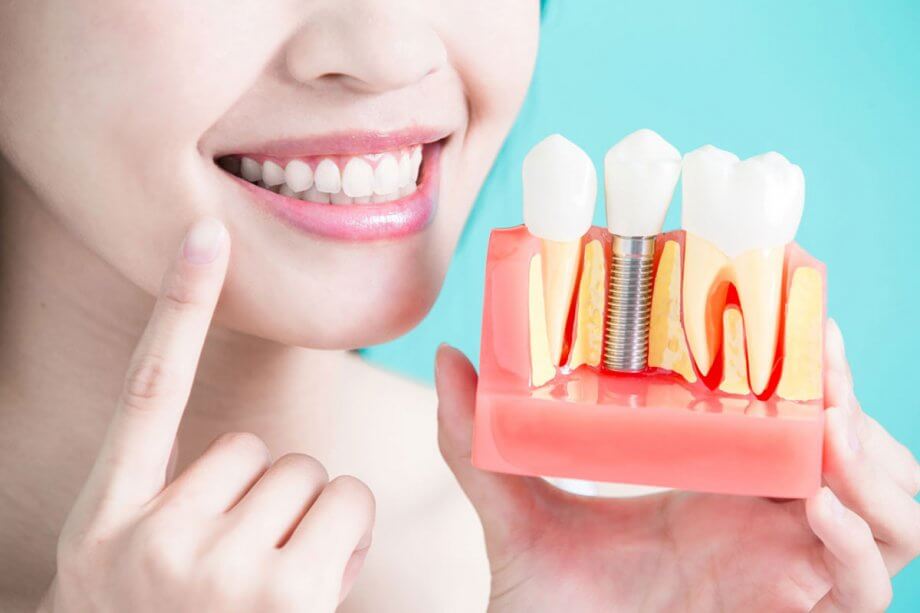Dental implants have been around for dozens of years and are the go-to treatment for replacing missing teeth. By surgically placing metal posts into the jawbone, dentists can replace one, some, or all of a patient’s teeth to preserve functionality and recreate a beautiful smile. While you may be nervous about having a dental implant performed, it has become the standard of care for replacing missing teeth, with a success rate of nearly 98%.
What is a Dental Implant?
In a dental implant surgery, metal screws are inserted beneath your gums and into the jawbone. These structures fuse to your bone over a period of several months, becoming an effective replacement to the roots of your former teeth and providing structure for artificial replacements or crowns. This added support makes dentures feel more comfortable, as well as stops them from shifting when you chew or speak.
Before Surgery
Prior to having your dental implant surgery, you will need to decide if dental implants are right for you. While dentures are a more cost effective method for replacing missing teeth, removing and inserting them can be a hassle. Additionally, dentures simply do not provide the same functionality that dental implants can provide, and may change the way food feels and tastes in your mouth. Dental bridges, while cemented into your mouth, require natural teeth for their attachment and may require unneeded drilling on perfectly healthy parts of your mouth. However, your ability to receive dental implants depends on several factors, including:
- Which tooth or teeth needs replacement
- Health of surrounding gums
- Strength of the jawbone
As with any major dental concern, you should always consult with your dentist to decide which option is best for you.
During Surgery
Just like any other procedure at the dentist, you can expect to have a local anesthesia administered to the surgery site. This injection numbs the surrounding area, which means you should feel little to no pain or discomfort. The first step to getting a dental implant involves the removal of any damaged teeth that are being replaced. In some cases, if there is enough bone, this can be done in the same appointment as the dental implant itself. In others, you may need a bone graft and around six months of healing before the implant can take place.
Once enough bone is present, the metal post can be inserted using a dental drill. When the implant is placed, a cap is placed over it and your gums can be sutured to begin the healing process.
After Surgery
Healing from dental implant surgery generally takes three or four months, but may vary depending on the strength of the bone the post was inserted into. As the anesthesia wears off, you may feel some pain or throbbing at the surgical area, but this will go away with time and can be alleviated by pain relievers such as aspirin or ibuprofen. Your dentist may also recommend using ice packs to reduce any swelling that may occur at the extraction site.
During the following months, it’s important to avoid any chewing or pressure on the implant, as this may interfere with healing or drive the post deeper into the bone. In addition, be sure to keep the area clean so that it doesn’t get infected, and to schedule regular follow up appointments so your dental surgeon can check on the progress of your healing. Be sure to follow their directions for any after-surgery care, including mouth rinses and antibiotics, to ensure a swift and speedy recovery.
Finally, once your dentist has determined the implant was successful, an abutment is attached via a tiny screw. A crown is custom-made to fit this abutment, and when it is attached, your dental implant is complete!
Risks & Complications
Although there is an incredibly high success rate for dental implants, complications can occur. Bleeding disorders or infection may affect your recovery speed, or excess pressure may overload or even fracture the metal post during the recovery period. Thankfully, even if your surgery is unsuccessful on the first try, a second attempt can usually be made without jeopardizing your oral health.
Ready to Get Started?
If you’re ready to start your dental journey with a caring and compassionate dental team in Aurora, Ohio, contact Aurora Dental today at 330-562-3400 to schedule your first appointment.

